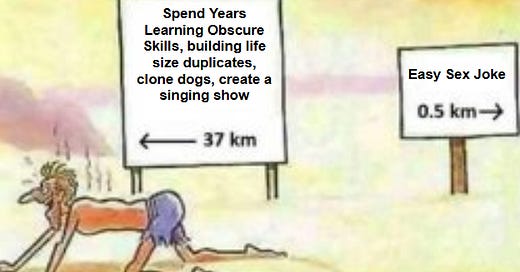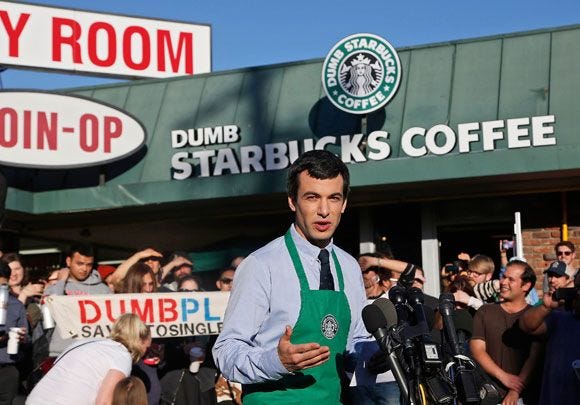There is a lot of garbage content out there these days. Let’s be honest, it’s mostly garbage content with a few bright spots. With what’s happening in the news, we need more distractions than ever.
In recent weeks, I had the good fortune to see works of art that will likely be discussed and re-watched much longer than the usual TikTok cycle. Succession creator Jesse Armstrong returns with a film Mountainhead, the premise being a few tech executives on a weekend retreat as a global calamity occurs, caused by deepfakes and Artificial Intelligence. Sounds like a far fetched scenario, I know.
If you want something more realistic, what about a TV series about a comedian flying a Boeing 737 to prove a point about airline safety? Well Nathan Fielder in season 2 of The Rehearsal, takes things to another level, physically and comedically. Fielder stretches the limits of what can be allowed on network television. He has shown to be fearless; allowing him to take his comedy to depths not previously seen. The Rehearsal season 2 is must-watch TV, that is among the best seasons of television this decade (thus far).
Keep reading to find out why you should watch these immediately.
But first, make sure to hit the Subscribe button below to be the 1,000th Subscriber to Serviceable Insights to get articles like these, delivered directly to their inbox.
If this week’s article does not interest you, please check out some other recent ones:
Mountainhead
Mountainhead is an incredible satire on the personalities of the Silicon Valley elites. It’s difficult not to see the film and immediately see it as an SNL style spoof on the All-In Podcast. Jason Schwartzman's character is clearly based on Jason Calacanis, the moderator of pod, that’s mostly famous for being friends with Elon Musk. He was also an early investor in Uber, which he reminds people about often. While’s he’s rich, he’s neither a billionaire or a centi-millionaire, making him the poor man of the group. Sacks and Chamath have ridiculed him for this on many occasions on the All-in pod. Although he’s well connected in tech circles, Calacanis lacks the pedigree of a top investor or company builder, which Chamath and Sacks are not afraid to remind him, when he’s taking a contrary position to them. They way they speak to him, sometimes borders on bullying, which is exactly the dynamic shown on Mountainhead.
While ripping on Jason is mostly good natured, some of their comments reveal the hubris from these besties. This isn’t completely unwarranted; they have played important roles in generation defining companies such as Google, Facebook, PayPal and others, while amassing large fortunes. Besides, what’s the point in having “eff you money”, if you don’t ever say eff you, every now and then?
This is all fine and good, but when you hear some of their comments and how quickly these tech executives have managed to secure access to the White House, it shows they clearly believe their powers extend far beyond the realm of tech or business. This isn’t exclusive to technology, plenty of energy or finance executives or former entertainers made forays into politics, with varied success. What’s different in this case, is the sincerity to which tech executives believe they are making the word a better place, regardless of clear negative externalities their products cause. The mantra of many tech elites appears to be, technology is not only the best solution to all human problems, it's the only one.
If regulators or governments dare get in the way, they are anti-progress. While satirical, it’s not a stretch to think that many tech elites would buy a country if they could. Not the U.S. or China, of course. But something small. Vulnerable. Maybe in the Caribbean.
The group dynamic in Mountainhead echoes what has been playing out in real time on the All-In Podcast. Chamath and Sacks are now full-on Trump whisperers. Calacanis is a devout Elon Musk loyalist, which, until recently, meant being softly pro-Trump even after years of warning how catastrophic his return would be. David Friedberg is the outlier, more intellectually honest, less partisan. Politically a libertarian, but still grounded in reality. He is the closest analogue to the film's Jeffrey "Jeff" Abredazi, a billionaire who, unlike the rest, seems aware that something has gone deeply wrong, and they might be the cause.
Then there is Venis "Ven" Parish, an amalgamation of Big Tech CEOs. He’s clearly some caricature of Zuckerberg, Bezos and Benioff, possibly others. Obsessed with biohacking, convinced he understands philosophy, and certain that his work is saving humanity. He does not just disrupt industries; he thinks he is evolving the species. Randall Garrett (Steve Carrell), isn’t exactly David Sacks. Maybe certain aspects of Peter Thiel or a Bill Gurly type. More of an old school VC, that serves as something of a mentor to the rest of the group. They give him a god complex, believing he can control his health and live forever. This is clearly referencing the longevity investments Thiel made a while ago. Perhaps also a reference to Bryan Johnson.
Regardless of the exact characters, the film will prove prescient. Misinformation and deepfakes are already distorting public perception. Open Twitter right now and scroll through footage from Israel or Iran. If you believed everything you saw, you'd assume both countries have been wiped off the map. In less than a generation, tech founders went from hoodie-wearing outsiders to front-row seats at inaugurations. Jesse Armstrong, the creator of Succession, brings the same scalpel here, eviscerating the powerful while making you laugh. If you loved Succession, you will love this. If you hate Big Tech, you will love this. If you work in tech, you will probably call it "mid."
The Rehearsal
Nathan Fielder is the new king of comedy
With all due respect to Severance and White Lotus, Nathan Fielder just created the standout season of television this decade. He also just snatched the crown from Sacha Baron Cohen (SBA), Eric Andre, and even the late Andy Kaufman to become the reigning king of method comedy.
Method acting, popularized by Marlon Brando and employed by modern legends like Daniel Day-Lewis and Jeremy Strong, requires the actor to stay in character throughout the shoot. Nathan has adopted a similar commitment, except his stage is the real world, and his character is just a strange, obsessive version of himself. This is in contrast to SBA or Kaufman that played characters with no similarities to their own personalities. The difference from the character Fielder plays on his shows and how he is in real life, is subtle. To the point that when he’s doing interviews, whether he’s promoting a show or not, it’s difficult to decipher if he’s still show Nathan.
This is likely because for most of his career, he performed under his own name. Fielder began his television career nearly twenty years ago doing short segments on This Hour Has 22 Minutes, a CBC comedy show. He was far from a main player but he did enough to convince execs at Comedy Central to let him launch his own show, Nathan for You. The premise was simple: Nathan, a supposed business genius, offers absurd marketing advice to small businesses. The execution was anything but. He started with simple premises such as having an ice cream store temporarily offer a poop-flavored ice cream. Convince a a realtor to guarantee any homes she sold were certified "ghost-free." He then took it to another level when he realized using parody law, he could rip off Starbucks. He created Dumb Starbucks. That last one went viral globally. People thought it was a Banksy installation. The stunt made international news before being shut down by health inspectors. Nathan had arrived.
The show wasn’t just about laughs, though it was consistently hilarious. It captured the quiet desperation of small business owners struggling under regulation, competition, and modernity. It revealed how easily Nathan could convince people to do outrageous things. And it hinted at the deeper commitment and ambition lurking beneath the surface.
(In 2014, I saw him at a show at the Just For Laughs Festival and got to ask him a question on stage)
By season three, Fielder had declared war on Uber with a sleeper cell of rogue taxi drivers. The logistics were insane. The laughs were real. But as his fame grew, and as smartphones made him more recognizable, the show became harder to produce. So he stepped back. He helped Sacha Baron Cohen on Who Is America?, consulted off-screen on other projects, and disappeared from the spotlight.
The Rehearsal
(Some Spoilers Alert)
The show begins with an odd but compelling premise: what if people could rehearse difficult moments in their lives before they happen? It quickly evolves into something surreal. In one storyline, Nathan helps someone rehearse becoming a parent by simulating an entire life with a child actor. Eventually, Nathan inserts himself into the simulation, raising the child himself, until it becomes impossible to tell where the show ends and Nathan begins.
Season one is weird, brilliant, and not for everyone. It is far from mass-audience sitcom territory. But if it clicks with you, it really clicks. Season two, is where he takes things further than you would expect from any network television show can go.
It starts with a genuine safety concern: many plane crashes are caused by miscommunication between pilots. Nathan investigates. He meets with the former head of the FAA, who agrees it's a problem. So Nathan does what any sane person would: he decides to stage a rehearsal for pilot communication. But not just that. He spends two years learning to fly starting on small planes working his way up until he is trained to pilot a commercial Boeing 737. Legally. He goes through the same training as a commercial pilot, finds a plan and flies 100 people, logging airtime under obscure FAA rules. The scene is astonishing. He actually lands the plane. It is not a joke. It is not CGI. He did it. Why? Because that is what the show required. Because that is who Nathan is.
Along the way, The Rehearsal explores real issues: the mental health of pilots, the pressure they face, the impossibility of disclosing conditions without risking their careers. It also remains funny, darkly, awkwardly, relentlessly funny. Nathan finds bizarre people and lets them talk. He recreates Sully’s Hudson River landing just to understand it better. He lives as Sully. He creates an alternate history where Sully isn’t actually a hero, he was just a dude distracted by Evanescence.
He takes on one of the largest film and television studios in the word: Paramount+. Fielder learnt they removed an old episode of Nathan for You , that as part of the episode, included the creation of a brand that raised money for Holocaust awareness. Paramount+ claimed it did not want to "take sides" in the Israel-Palestine conflict, so it pulled any content related to Judaism. Despite pointing out to them that they still host plenty of content related to N@zis and other potentially sensitive content, the studio did not reverse their position. His response is scathing.
At the time, The Curse, his other show with Emma Stone and the Safdie brothers, was waiting on a season two renewal with Paramount+. He wasn’t just risking a professional relationship. He was risking his career. That HBO let the episode air is nothing short of astonishing. This goes to show, not only the lengths Nathan will go, but the extend to which the network, will allow him to spend endless money and go after anything he sees fit. HBO or Max, whatever they call themselves these days, is not a small network. This isn’t Adultswim or some small network. They have shareholders and eliminate even decent shows at the drop of a hat. They allow Fielder to do this because they acknowledge that he’s special. He might not drive the most views, but for the people who get him, they will subscribe to HBO just to watch anything he does.
He’s built a fiercely loyal fanbase because Nathan Fielder is fearless. He commits harder than anyone. He never breaks. And somehow, always lands the plane.
Thank you for reading. If you liked this article please Subscribe below. Each week I publish an article on a wide range of topics from business, books, current events or anything on my mind.













Some good recs here - thank you!
"In less than a generation, tech founders went from hoodie-wearing outsiders to front-row seats at inaugurations."
Creating several trillion dollars in market cap will cause this to happen.